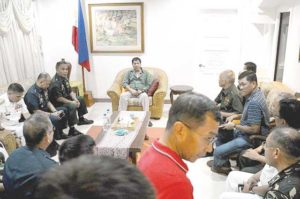Media groups and various sectors were outraged over incoming President Rodrigo Duterte’s statement that journalists deserve to die if they are corrupt.
Duterte made the statement in response to a question on how he will handle the killing of journalists.
“Just because you’re a journalist you are not exempted from assassination, if you’re a son of a bitch,” he said.
Speaking at a news conference in his hometown of Davao City, of which he is mayor, to introduce his Cabinet on Tuesday night, Duterte suggested that majority of those media victims were partly to blame.
“Most of those killed, to be frank, have done something. You won’t be killed if you don’t do anything wrong,” he said.
Duterte cited the case of Jun Pala, a journalist and politician who was killed in Davao City in 2003.
Gunmen on a motorcycle shot dead Pala, who was a vocal critic of Duterte. His murder has never been solved.
“If you are an upright journalist, nothing will happen to you,” said Duterte, who has ruled Davao as mayor for most of the past two decades and is accused of links to vigilante death squads.
“The example here is Pala. I do not want to diminish his memory but he was a rotten son of a bitch. He deserved it.”
The National Union of Journalists of the Philippines (NUJP) described the comments as “appalling.”
It conceded there were corruption issues in the industry but said these did not justify murdering reporters.
“He has also, in effect, declared open season to silence the media, both individual journalists and the institution, on the mere perception of corruption,” the NUJP said in a statement.
The Philippines is one of the most dangerous nations in the world for journalists,
with 176 murdered since a chaotic and corruption-plagued democracy replaced the strongman rule of then-President Ferdinand Marcos three decades ago.
Luis Teodoro, deputy director of the Manila-based Center for Media Freedom and Responsibility, also described Duterte’s comments as “distressing” and said they sent a signal to would-be killers that it was okay to murder in certain circumstances.
“When you say corrupt journalists can be killed, that is a very clear message,” Teodoro said.
The New York-based Committee to Protect Journalists also condemned Duterte’s remarks.
“What he has done with these irresponsible comments is give security officials the right to kill for acts that they consider defamation,” its Southeast Asian representative, Shawn Crispin, said from Bangkok.
“This is one of the most outrageous statements we have ever heard from a President [of] the Philippines.”
No basis
University of the Philippines journalism professor Danilo Arao said the killings of journalists and media workers have less to do with them being unethical or unprofessional and more to do with the brazenness of those in power.
“President-elect Rodrigo Duterte’s claim that journalists who got killed deserved to die has no logical basis, even at the level of analyzing if the punishment fits the crime,” Arao noted in his Facebook account.
“If we use the argument that being unethical or unprofessional is tantamount to being killed, then that would give, for example, the license for teachers to kill students for bad grammar. But teachers don’t do that for the simple reason that it doesn’t make sense,” he added.
According to him, the culture of impunity in various societies is systemic.
“We should not fall into the trap of being subjective by just simply identifying how many among those killed were unethical or unprofessional. In various impunity indices worldwide, there is no such data disaggregation,” Arao said.
The College Editors Guild of the Philippines (CEGP) said Duterte’s statement on media killings is a faulty generalization in which he failed to understand how the intensifying culture of impunity perpetuates the killing of journalists and media workers in their line of duty.
“It is without denial that as journalists, the job description to expose the truth behind the general scheme of things is above all else. President-elect Duterte does not grasp the reality behind the unabashed killing of journalists which usually happens when doing their job as the harbingers of news to expose the malfeasance and corruption plaguing the government in the local and national level. The outgoing Aquino regime failed to address such atrocities and instead complained that the media has been nothing but critical of his administration,” Marc Lino Abila, the group’s national president, said in a statement.
The campus press urged Duterte to protect and uphold press freedom.
“He should be reminded that it is within his responsibility to address the already-worsening culture of impunity in the country,” Abila added.
Meanwhile, the family of slain broadcast journalist and environmentalist Gerry Ortega also on Wednesday deplored the statement of Duterte, saying it is “alarming” as it casts judgment on murdered journalists without due process.
In a statement sent by Ortega’s daughter, Michaella, the family said Duterte’s remarks came as a shock considering that justices is yet to be given them despite the arrest of former Palawan governor Joel Reyes and his brother, former Coron town mayor Mario Reyes.
The Reyes brothers are alleged to have masterminded Ortega’s assassination in Puerto Princesa City, Palawan, in 2011, a charge the two had repeatedly denied.
“Our family is incensed by the hasty and crass generalizations made about murdered journalists in the country. Doctor Gerry Ortega was killed for his courage and integrity. He was murdered precisely because he was honorable. He fought for social justice. He stood up against mining in Palawan. He exposed corruption in the provincial government, which included the misuse of billions of pesos from the Malampaya funds,” the Ortega family said.
Just last week, a tabloid reporter was shot dead by an unidentified gunman in Manila.
At least 174 journalists have been killed since 1986.
The worst incident was in November 2009 when 32 journalists were among the 58 people killed in Maguindanao allegedly upon the orders of the influential Ampatuan clan.
With AFP


